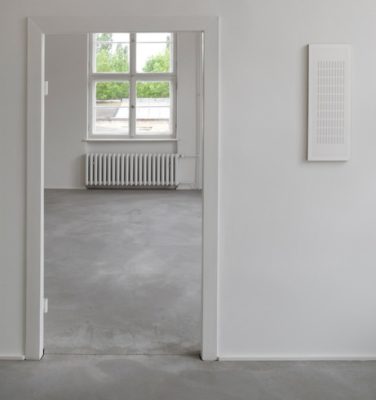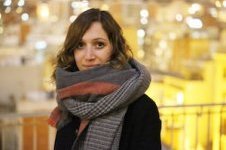Search
To search for an exact match, type the word or phrase you want in quotation marks.
A*DESK has been offering since 2002 contents about criticism and contemporary art. A*DESK has become consolidated thanks to all those who have believed in the project, all those who have followed us, debating, participating and collaborating. Many people have collaborated with A*DESK, and continue to do so. Their efforts, knowledge and belief in the project are what make it grow internationally. At A*DESK we have also generated work for over one hundred professionals in culture, from small collaborations with reviews and classes, to more prolonged and intense collaborations.
At A*DESK we believe in the need for free and universal access to culture and knowledge. We want to carry on being independent, remaining open to more ideas and opinions. If you believe in A*DESK, we need your backing to be able to continue. You can now participate in the project by supporting it. You can choose how much you want to contribute to the project.
You can decide how much you want to bring to the project.

John Wilkins, who lived towards the second half of the 17th century, is known for having wanted to create a system of units that would serve everyone. He didn’t just define a longitude, volume and universal mass but also speculated with the possibility of generating a world language. A language, that would serve to classify all knowledge in the world; in which each word would define itself and thus function for everybody [[Jorge Luís Borges explains how this language functions in the essay “The Analytical Language of John Wilkins”. versión digital: http://www.ccborges.org.ar/constelacionborges/enciclopedia/El%20idioma%20analitico%20de%20john%20wilkins.pdf]].
But to believe in a universal system of representation is to eliminate any form of difference, to bypass anything that can’t be classified. It is to forget that words, in themselves, have no meaning and that it is the relation of each one of us with them that links them to a meaning; it is to think that the relations between people, words and things are the same everywhere and the same for everyone. Perhaps this belief in a common alphabet that is able to read everything comes from a desire to understand each other. However, perhaps this way of understanding each other would only be possible with the imposition of a more powerful ideology. Perhaps, if a system of universal representation were really possible, it wouldn’t be necessary to communicate with each other.
Though the team at the Haubrok Foundation in Berlin, insist that they don’t now all the details about what went on previously in the precinct of the district of Lichtenberg, where since a year and a half ago this private foundation dedicated to art can be found, they do explain certain things. What is known is that it is an old industrial complex, of 18.000 square metres, constructed at the beginning of the 20th century and designed to be a Spiritusfabrik (spirits distillery). It is said that from the fifties onwards it was occupied by the espionage services of the DDR, under the guise of the supposed activity of “transport control”. Currently some of the thirteen buildings that make up this industrial complex have been refurbished and opened to the public of contemporary art, offering exhibitions from the Haubrok collection, workshops for artists and a laboratory for digital printing. Since the beginning of June, one of the 13 buildings holds an exhibition of work by Stanley Brouwn.
The girl who is invigilating the exhibition assures that the remodelling of this space has been done as close to what it is originally thought to have been. Everything is white, empty, the windows are square and the panes of glass are thick. In each chamber there is a piece by Brouwn, and all of them, in equal measure, are easily overlooked. With his work, the artist points to measurement and metred systems: the letter of the alphabet which enables us to read the space, the most basic element, and perhaps the most abstract, that which aims to establish a relation between the space and the subject, that wishes to offer a measure for each thing and which ought to serve everyone.
If I endeavour to talk about Brouwn, all I can say is that I know only the little about him that he lets be known. On the net, one finds only a unique portrait of this artist, who doesn’t go to openings and who retains strict control over the images that circulate about him and his work. The effort of remaining in a state of absence is what characterises him. All of this, however, forms a paradox: for the only way to be absent is by ensuring that one is present. Making sure to be what is missing. Making sure to be what all those present are thinking about. To be thought about is a way of being, one that is possible only thanks to the action of others, and which entirely escapes our control, it being hard to know the times one has been thought about. To be absent consists in disappearing and that they seek you out, that they think of you and that they make you real in a virtual dimension, where the idea of you will be filled with idealizations, memories and hypotheses.
To look for Brouwn and not find him. Is that not also a way of constructing an identity? Or of creating a representation based on the few clues that he leaves us by way of some more or less universal parameters? The tendency to universalize is perhaps a reaction to the fear that can be provoked by thinking that each reality is an interpretation, and that even we ourselves are different when we are absent and others construe us, with their thoughts. Each system of measurement wants to be universal, as does each alphabet and it seems that with his disappearance, Brouwn wants to say to us that his presence is not necessary – in that his message is universal–.
But to believe this would be, up to a certain point, a gesture of naivety, as it would imply overlooking the fact that his absence, the impossibility of his representation, is also part of his work. How can one measure the unknown, what escapes us? How can one describe it and represent it through systems that don’t contemplate the peculiarities of the way of being of that which doesn’t want to be present? Or to which we can’t gain access?
The girl who invigilates the space is of the opinion that the whole shed seems to have been designed to contain the work of Brouwn. If I ask myself why, I realize that there is an almost inevitable association of ideas. The fact of knowing that this place has been a Spiritusfabrik reminds me of the act of calling upon “spirits”, relating in this way those easily evaporating liquids to what escapes me, to what disappears: a mystical sigh that for a long time couldn’t be classified because scientific methods couldn’t demonstrate its existence. Only faith sustained it.

Anna Dot was born on a Sunday in April. She is from Torelló and works between two worlds, worlds that she cannot perceive as being in any way separate: one of artistic production and one of reflection, writing about contexts of art.
"A desk is a dangerous place from which to watch the world" (John Le Carré)